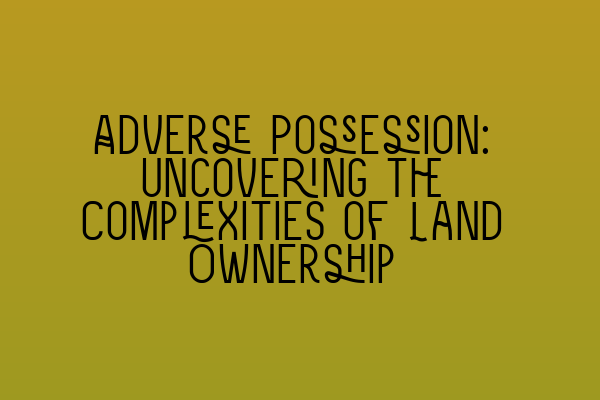Adverse Possession: Uncovering the Complexities of Land Ownership
When it comes to land ownership, there’s a concept that transcends the mundane understanding of buying and selling properties. It’s called adverse possession, and it can have significant implications for both the current owners and those seeking to claim ownership of land. In this article, we’ll dive deep into the complexities of adverse possession, exploring its legal basis, requirements, and potential pitfalls. So, grab a cup of coffee and prepare to unravel the intricacies of land ownership!
The Legal Basis of Adverse Possession
At its core, adverse possession is a legal principle that allows an individual to claim ownership of land based on the continuous and open possession of that land for a specified period of time. The basic idea behind adverse possession is that if someone occupies and uses a piece of land without the owner’s permission for a long enough period, they should be recognized as the rightful owner.
Adverse possession laws vary from jurisdiction to jurisdiction, but they typically require several elements to be met for a successful claim:
- Actual Possession: The claimant must physically occupy the land and treat it as their own. Mere trespassing or occasional use may not be sufficient.
- Open and Notorious Possession: The claimant’s possession must be visible and obvious to others, putting the true owner on notice. The landowner should have a reasonable opportunity to know about the adverse possessor’s occupation.
- Exclusive Possession: The claimant must possess the land exclusively, preventing others, including the true owner, from using or accessing it.
- Hostile Possession: This requirement does not mean hostility in the ordinary sense. It simply means that the claimant’s possession is without the permission or consent of the true owner.
- Continuous Possession: There must be a continuous period of occupancy without any substantial gaps or interruptions.
- Possession for a Statutory Period: The claimant must possess the land for a specific period defined by the relevant jurisdiction’s laws.
It’s crucial to note that the length of the statutory period required for adverse possession varies in different jurisdictions. In England and Wales, for example, it is generally 10 or 12 years, depending on the circumstances. Therefore, it’s essential to consult with a qualified legal professional to understand the specific requirements of your area.
The Potential Pitfalls of Adverse Possession
Although adverse possession can be a legitimate means of acquiring land, it’s not without its challenges and potential pitfalls. Understanding these potential issues is crucial for both the current landowner and anyone seeking to claim ownership.
Firstly, adverse possession can be an emotionally charged situation, as it involves disputed land rights. The true owner may face the dilemma of losing a piece of their property to someone who occupied it without their permission. On the other hand, adverse possessors may encounter resistance from the true owner, leading to legal disputes and potential legal costs.
Secondly, adverse possession can be a complex legal process. The burden of proof rests on the claimant, who must provide evidence of all the necessary elements to assert their claim. Gathering evidence and presenting a solid case can be challenging, especially for individuals who lack legal expertise. Therefore, seeking the assistance of a qualified solicitor with experience in property law is highly recommended.
Thirdly, adverse possession laws can be nuanced and subject to various exceptions. For example, if the true owner is a minor, mentally disabled, or in the military, the statutory period may not begin until certain conditions are met. Moreover, special rules may apply to public land or registered land, requiring additional considerations. Familiarizing yourself with the specific legal requirements and exceptions is essential to navigate the adverse possession process successfully.
Conclusion
Adverse possession is a fascinating legal concept that expands the boundaries of land ownership. While it can provide an avenue for claiming ownership of land, it is by no means a straightforward process. The legal requirements, potential pitfalls, and exceptions make it a complex area of property law that necessitates professional guidance.
If you find yourself involved in an adverse possession dispute, or if you are considering claiming ownership of land through adverse possession, we highly recommend consulting with our experienced solicitors at SQE Property Law & Land Law. Our team of experts is well-versed in the intricacies of property law and can provide you with the guidance and representation you need. Contact us today to schedule a consultation and ensure your interests are protected.
Related Articles:
